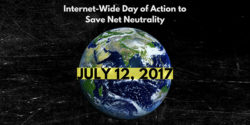Today is the Day of Action to Save Net Neutrality. Radio Survivor is a supporter because we understand clearly how the internet is a powerful medium to disseminate diverse and independent voices. As an independent online publication and podcast Radio Survivor fundamentally relies on a free, unfiltered internet to exist and communicate with fellow radio lovers around the world.
But our support of net neutrality is about more than self interest. The distance between broadcast radio and internet radio gets narrower every day, as more people tune in on their computers and smartphones, even if they’re listening to the online stream of a terrestrial station. For many listeners public radio and podcasts are nearly synonymous, choosing to listen to “This American Life” on demand, at their own convenience, rather than when dictated by a broadcast schedule. Millions of other listeners turn to internet stations to hear music and genres that are almost impossible to receive over the air.
The internet’s low barrier to entry has resulted in an explosion of audio options, with a very long tail made up of independent broadcasters, podcasters, DJs and producers who each may only attract a few dozen listeners. But for each listener their artistry is a welcome escape or a needed entertainment, if not a lifeline, supplying music, information or ideas that would be nearly unfindable in the pre-internet era.
Net neutrality is the principle that every bit of legal data and content on the internet should be treated equally. Mapped onto radio, this means every internet radio listener should be able to access her local college radio stream as easily as iHeartRadio. Every podcast fan should be able to download an obscure show about tabletop games just as quickly as an ESPN show. Any online audio listener shouldn’t find it harder to get independent DJ mixes, shows or streams than content from a bigger company that paid for the privilege of disproportionate access to your ears.
Crucially, listeners and broadcasters alike should have equal access across both wired and wireless internet connections. Your listening choices shouldn’t me more constrained simply because you’re using a mobile device or smartphone.
The FCC has guaranteed and enforced these protections since February 2015 when it passed the Open Internet Order. But new FCC Chairman Ajit Pai intends to overturn these rules. That is why hundreds of organizations and thousands of internet users are coming together for this day of action.
You can do your part by submitting your comments to the FCC in support of net neutrality. As my colleague Matthew Lasar pointed out, public comments really do matter, because they are a part of the public record, which can be cited by lawmakers, in legal briefs and even in legal opinions.
It’s most effective if you can cite personal experience or testify to specific circumstances that are relevant in your community. For instance, Chairman Pai argues that the Open Internet Order has stunted the roll out of high speed internet across the country. But is that true in your community? I can attest that in my city both local ISPs have rolled out higher speed service in the last year, including a significant rollout of gigabit fiber.
Facts matter, especially to courts. If Pai succeeds in passing his ironically titled “Restoring Internet Freedom” order, undoing net neutrality protections, that decision will most definitely be challenged in court by public interest advocates. They will dive into the public comment record looking for facts and testimony that support net neutrality.
Resources to Take Action
BattleFortheNet.com and SaveTheInternet.com both make it easy to submit your comments.
As some background to help frame your comments, here are the protections that the Open Internet Order provides:
- No Blocking: broadband providers may not block access to legal content, applications, services, or non-harmful devices.
- No Throttling: broadband providers may not impair or degrade lawful Internet traffic on the basis of content, applications, services, or non-harmful devices.
- No Paid Prioritization: broadband providers may not favor some lawful Internet traffic over other lawful traffic in exchange for consideration of any kind—in other words, no “fast lanes.” This rule also bans ISPs from prioritizing content and services of their affiliates.
Back in April Gizmodo did a handy rundown of “the worst lies” in a speech that Pai gave announcing his plan to undo net neutrality. In short, he claims that net neutrality is bad for online privacy, has harmed online investment, exacerbates “digital redlining” keeping access from disadvantaged communities, and that the there were no problems with blocking or throttling access prior to the Open Internet Order passing in 2015.
For your own comments, consider arguments and facts that disprove these arguments. How does net neutrality enhance, or at least not harm, privacy? Do you see evidence of broadband investment and rollout in the last two years?
To the last point—that there was no blocking or throttling prior to 2015—consult this handy list of pre–2015 net neutrality violations that Free Press logged. Perhaps you have some examples of your own?



